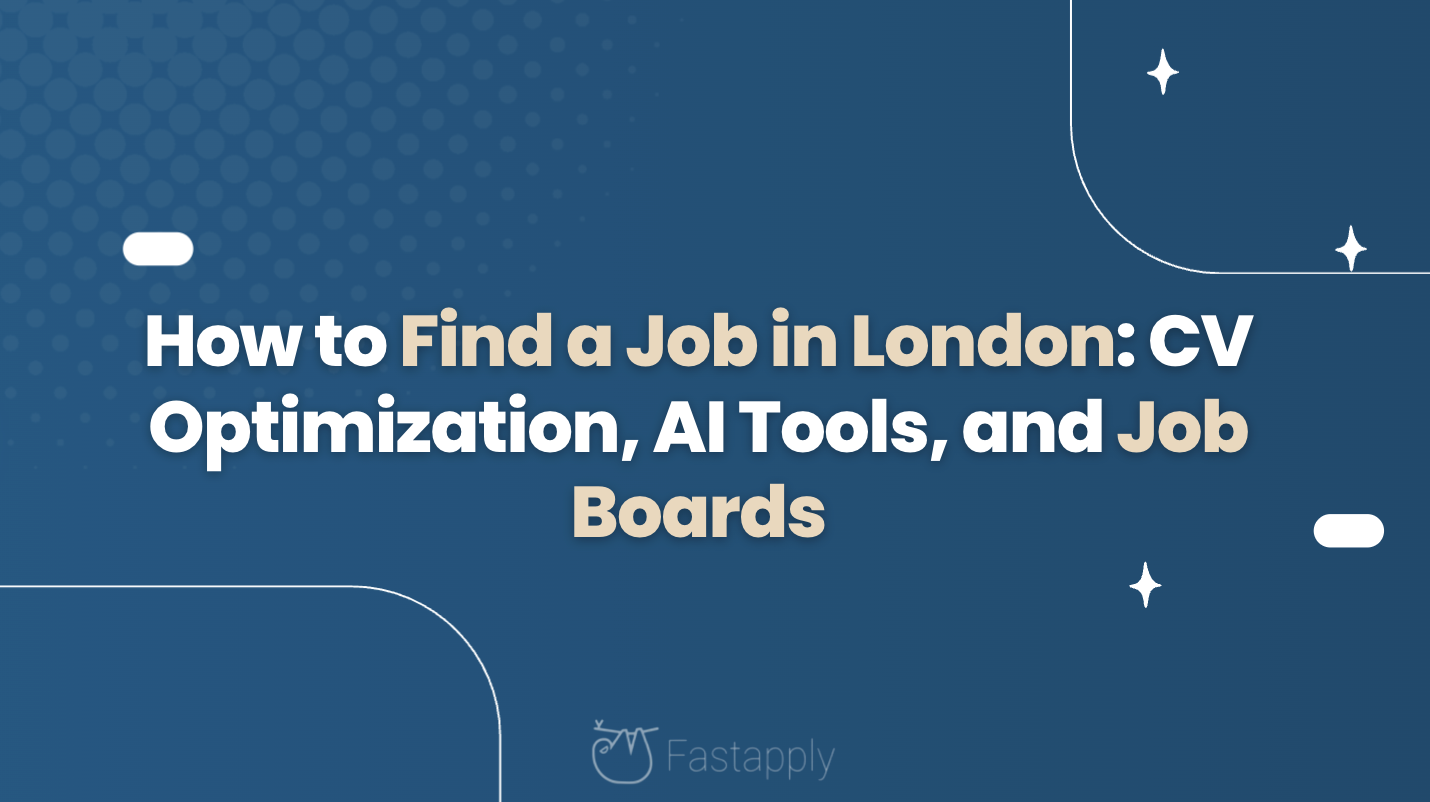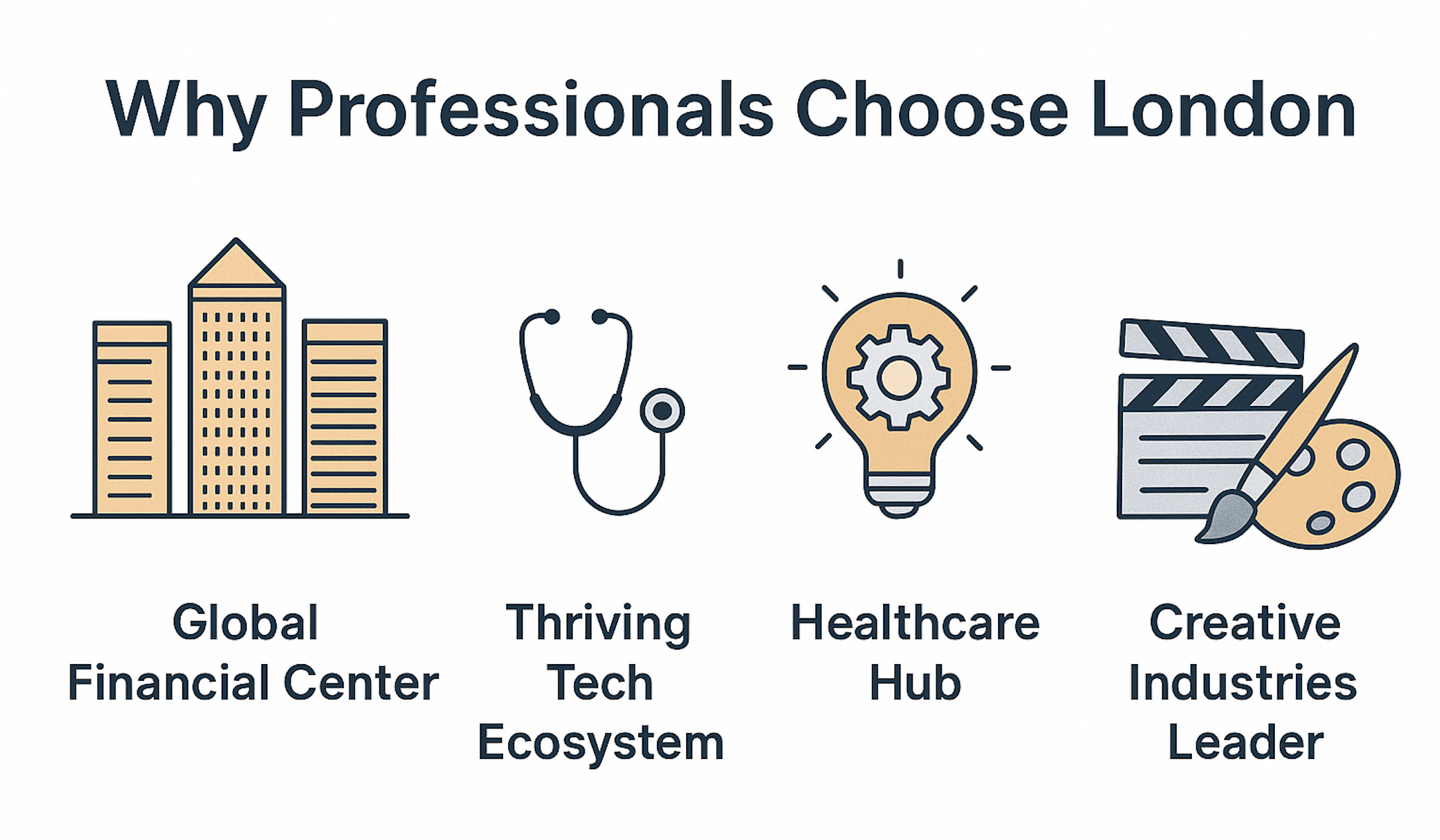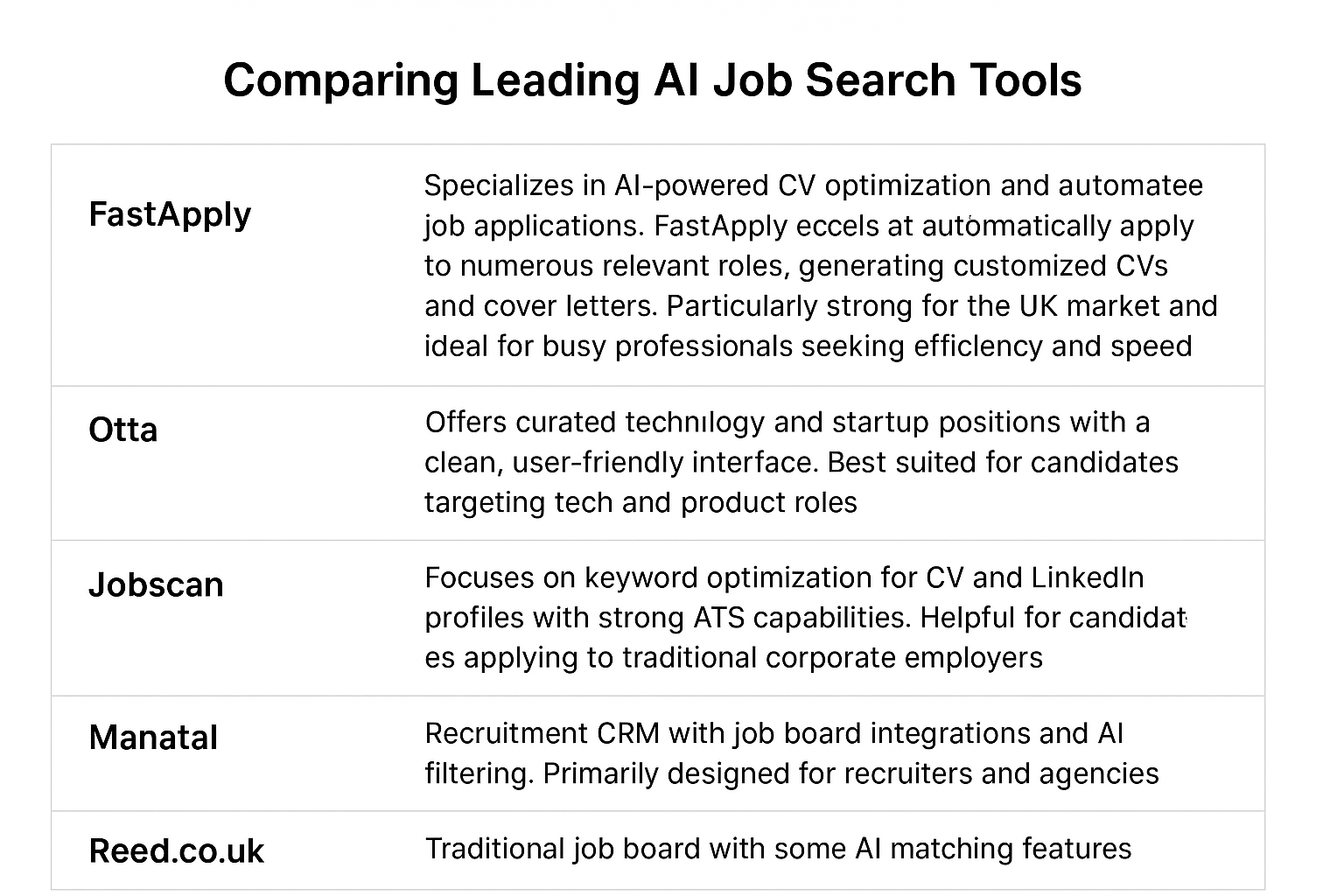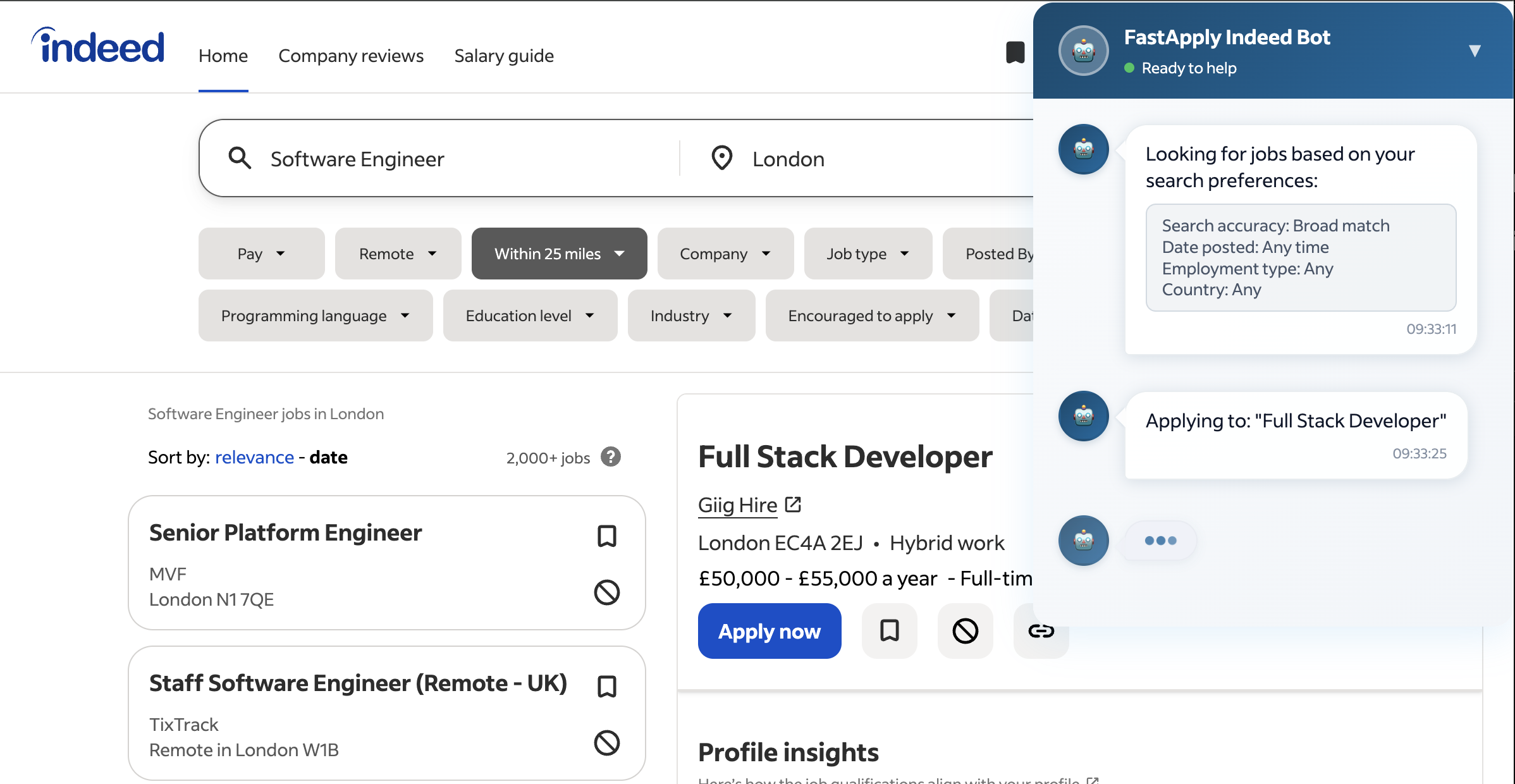How to Find a Job in London: CV Optimization, AI Tools, and Job Boards

London attracts ambitious professionals from around the world, and it’s easy to see why. The city offers unparalleled career opportunities across various industries, including finance, technology, healthcare, and the creative fields. However, the job market here is notoriously competitive, and success requires more than just submitting applications, it demands strategy, preparation, and innovative use of modern job search tools.
This guide will walk you through everything you need to know about securing employment in London, including which industries are hiring, how to navigate the UK job market, and how tools like FastApply can dramatically accelerate your search.
London’s Job Market: What Makes It Unique
London’s economy is remarkably diverse. While traditional sectors such as retail, education, and healthcare continue to employ large numbers of people, the city has also become a global hub for financial services, a rapidly expanding technology center, and one of the world’s leading creative capitals. This diversity means opportunities exist for nearly every professional background—but it also means the competition is fierce.
Why Professionals Choose London
Global Financial Center: Canary Wharf and the City of London are home to some of the world’s most influential banks, investment firms, and consultancies, creating thousands of opportunities for finance professionals.
Thriving Tech Ecosystem: The East London tech scene, particularly around Shoreditch’s “Silicon Roundabout,” has become a magnet for startups, engineers, and digital innovators.
Healthcare Hub: The NHS represents the UK’s largest employer and maintains consistent recruitment across medical specialties, nursing, and support roles.
Creative Industries Leader: From major advertising agencies to West End productions, London’s creative sector offers unmatched opportunities in arts, media, and design.
The reality is straightforward: you’ll face significant competition from talented candidates worldwide, but you’ll also access career opportunities unavailable elsewhere.

Starting Your London Job Search
Understanding the Market
Begin by identifying which geographic areas align with your industry. Financial roles are concentrated in Canary Wharf and the City, while technology positions cluster in East London. Retail and hospitality opportunities are spread throughout the city.
Preparing Your Application Materials
UK employers expect specific CV standards that differ from those in other countries. Keep your CV to a maximum of two pages, focusing intensely on quantifiable achievements rather than job responsibilities, and ensure the formatting is clean and ATS-friendly. Long, detailed job descriptions without measurable outcomes typically get rejected quickly.
Essential Job Platforms
The most effective job boards for London include Indeed, LinkedIn Jobs, CWJobs (which is particularly strong for technology roles), and NHS Jobs for healthcare positions. Different industries favor different platforms, so research where your target employers typically post openings.
Visa Considerations for International Candidates
If you’re applying from outside the UK, understanding visa requirements is crucial. The UK maintains a shortage occupation list that covers roles such as nursing, social care, and specific IT specialties. Positions on this list are significantly easier to secure because employers face streamlined sponsorship processes.
The Power of Networking
London’s job market operates heavily on professional connections. Many positions never reach public job boards; instead, they are filled through referrals and internal networks. Attending industry events, maintaining an active LinkedIn presence, and leveraging personal connections can unlock opportunities that traditional job applications may not.
Major Industries and Hiring Sectors
Understanding where demand exists helps target your search effectively. While London offers opportunities across numerous fields, specific sectors consistently show more vigorous hiring activity.
Finance and Banking
London’s financial district remains one of the world’s most important. Canary Wharf and the Square Mile house major institutions such as HSBC, Barclays, and JPMorgan, along with numerous smaller firms. Entry opportunities include analyst programs and graduate schemes, while experienced professionals transition into roles such as asset management, consulting, and specialized finance.
Specialized platforms, such as eFinancialCareers and CityJobs, list finance-specific openings. Be prepared for rigorous competition—many employers seek strong academic credentials or professional certifications, such as the CFA.
Technology and Startups
London’s technology sector has experienced explosive growth over the past decade. The Shoreditch area is home to hundreds of startups, alongside central tech company offices, including those of Google, Amazon, and Microsoft. Typical roles span software engineering, product management, cybersecurity, data science, and more.
For technology positions, check CWJobs, Otta, and Technojobs regularly. London’s fintech sector, which merges finance and technology, continuously seeks developers, analysts, and product specialists.
Healthcare
The National Health Service employs more people than any other UK organization, and London’s hospitals and clinics maintain ongoing recruitment needs. Nursing, social care, and certain medical specialties are listed as shortage occupations, making them more accessible to international applicants.
NHS Jobs serves as the official platform for NHS positions, while HealthJobsUK lists specialized healthcare roles. International healthcare workers typically require UK accreditation, such as GMC registration for physicians or a nursing PIN for nurses.
Education
London’s education sector encompasses primary schools, secondary schools, colleges, and prestigious universities. Teaching positions are commonly advertised on TES Jobs, while universities such as UCL, King’s College, and Imperial College regularly hire academic staff and researchers.
State schools generally require Qualified Teacher Status (QTS), though private schools, language centers, and tutoring companies often maintain more flexible requirements.
Creative Industries
London excels particularly in creative fields. The BBC, global advertising firms, fashion houses, publishing companies, and West End theatres all maintain significant operations in this area. Beyond major employers, countless smaller studios, galleries, and independent production companies hire creative talent.
Breaking into the creative industries often requires strong networking, alongside a solid application. Platforms like The Dots and Creativepool list creative opportunities, but building a compelling portfolio and attending industry events are equally important.
Job Search Tactics by Career Stage
Your approach to the London job market should align with your career level. Graduate candidates, mid-career professionals, and executives each need different strategies.
Recent Graduates and Entry-Level Candidates
For those starting their careers, London can seem daunting. The most effective entry paths typically involve graduate schemes, internships, or junior positions. Major employers, especially in finance, consulting, and technology, open graduate program applications months in advance—sometimes nearly a year before start dates.
Practical strategies for entry-level candidates:
- Check platforms like TargetJobs and Milkround for graduate schemes and internships
- Use Prospects to track application deadlines and timelines
- Emphasize achievements even when experience is limited—employers value potential and enthusiasm
- Prepare thoroughly for assessment centers, which often combine group exercises, aptitude tests, and interviews in a single day
Mid-Career Professionals
With several years of experience, networking becomes increasingly essential. Many mid-level positions are filled through referrals before being posted publicly. Invest time attending industry events, conferences, and professional meetups relevant to your field.
Recruitment agencies can prove particularly valuable at this stage. London hosts numerous specialized recruiters focusing on specific industries, including IT, finance, legal, creative, and more. Quality recruiters can connect you with unadvertised positions, though you must communicate your goals clearly and professionally.
Consider pursuing relevant certifications to strengthen your candidacy. PRINCE2 for project managers, cloud certifications for IT professionals, or CIM qualifications for marketers can differentiate your application significantly.
Executive and Senior Leadership
At senior levels, the job search operates differently. Most executive and C-suite positions get handled through headhunters and executive search firms rather than public listings. These firms actively scout talent rather than waiting for applications.
Building visibility becomes essential. Join relevant professional associations, participate in industry clubs, or speak at conferences and events. For example, technology leaders gain recognition by contributing to panels during London Tech Week. Maintaining a strong LinkedIn presence with regular thought leadership content keeps you visible to decision-makers.
Remember: the more senior the position, the less likely it is to be publicly announced. Success requires investing in your professional presence and network consistently over time.
Leveraging AI-Powered Job Search Technology
Recent years have fundamentally transformed job searching. Rather than spending countless hours manually browsing listings and crafting individual applications, many candidates now use AI-powered platforms that automate significant portions of the process. In a competitive market like London, these tools offer considerable time savings and a competitive edge.
How AI Changes Job Hunting
Traditional job boards, such as Indeed and LinkedIn, remain helpful, but they require substantial manual effort. AI-driven platforms offer:
- Automated scanning of thousands of daily job listings with intelligent filtering
- Skill-based matching rather than relying solely on job titles
- Automatic tailoring of CVs and cover letters for each application
- Application tracking with follow-up reminders
This automation proves especially valuable in London, where popular positions often receive hundreds of applications within hours of being posted.
Comparing Leading AI Job Search Tools
FastApply: Specializes in AI-powered CV optimization and automated job applications. FastApply excels at automatically applying to numerous relevant roles, generating customized CVs and cover letters for each position. Particularly strong for the UK market and ideal for busy professionals seeking efficiency and speed.
Otta: Offers curated technology and startup positions with a clean, user-friendly interface. Best suited for candidates targeting tech and product roles.
Jobscan: Focuses on keyword optimization for CVs and LinkedIn profiles with strong ATS capabilities. Helpful for candidates applying to traditional corporate employers.
Manatal: Recruitment CRM with job board integrations and AI filtering. Primarily designed for recruiters and agencies.
Reed.co.uk: Traditional job board with some AI matching features and a large UK job pool. Suitable for general job seekers.

Why FastApply Works for London Job Seekers
FastApply distinguishes itself through comprehensive automation. Instead of applying to positions individually, FastApply can automatically submit applications to hundreds of roles matching your profile. In London’s fast-moving job market, where speed often determines whether recruiters even see your application, this automation provides a critical advantage.
FastApply also specializes in UK hiring standards. It automatically formats CVs according to UK expectations—concise presentation, achievement-focused content, and ATS-compatible formatting that works with the applicant tracking systems most London employers use.
One particularly valuable FastApply feature is COPILOT mode. Rather than running on complete autopilot, COPILOT mode allows you to review, approve, or modify applications before submission. This provides an optimal balance: automation saves time on repetitive tasks, while you maintain control to fine-tune high-priority applications.
Think of FastApply as handling the tedious, time-consuming aspects of your job search, freeing you to focus on interview preparation and networking.

Practical Strategies for Success
Even with excellent tools, your applications must meet the expectations of the UK market. London employers review thousands of CVs weekly, making differentiation crucial.
Crafting a UK-Standard CV
Keep it brief: Two pages maximum. Lengthy CVs rarely get read completely.
Emphasize achievements over duties: Transform “Managed a customer service team” into “Led a 7-person customer service team that improved satisfaction scores by 25% in one year.”
Exclude personal details: UK employers don’t expect photographs, age, or marital status on CVs.
Use British spelling: Write “organisation” not “organization,” and “programme” not “program” (except in software contexts).
Tools like FastApply automatically adjust your CV to meet these standards, eliminating the need for hours of manual reformatting.
Optimizing Your LinkedIn Profile
London recruiters rely heavily on LinkedIn for candidate sourcing. Key optimization steps:
- Create a professional headline extending beyond your job title (example: “Marketing Manager | B2B SaaS, Content Strategy, Demand Generation”)
- Complete the “About” section with a concise narrative showcasing both skills and personality
- Collect endorsements and recommendations—these significantly influence recruiter perceptions
- Maintain activity by sharing relevant articles, commenting on industry discussions, and connecting with professionals in your field
Effective Networking Approaches
Networking benefits professionals at all career stages in London, not just executives. Consider:
Technology Meetups: Search Meetup.com for coding, AI, product management, or other tech-focused groups
Creative Networking Events: The Dots regularly hosts gatherings for designers, marketers, and creative professionals
Career Fairs: Universities and professional associations organize regular fairs open to the public
Consistency matters more than intensity. Attending a single event rarely yields immediate results, but becoming an active community participant significantly increases your visibility over time.
Understanding Visa Requirements
Non-UK and non-EU citizens typically require a visa for employment in London. The Skilled Worker visa, which requires employer sponsorship, is the most common. Roles on the shortage occupation list—including nursing, social care, engineering, and specific IT positions—are easier to secure because employers face lower costs and less administrative burden when sponsoring these roles.
The process requires your prospective employer to be government-approved and officially sponsor your application. As of 2025, positions typically require a graduate-level skill set with salaries meeting a minimum threshold of approximately £41,700 annually (or the standard rate for the specific role, whichever is higher).
The Graduate visa enables students who complete a UK degree to work for two years afterward. This period can be strategically leveraged to secure a sponsored position, leading to a longer-term residency.
Final Thoughts: Your London Career Journey
Securing employment in London presents genuine challenges. The market is intensely competitive, living costs are substantial, and the city’s pace can feel overwhelming initially. However, for well-prepared candidates, London offers some of the world’s best career development opportunities. The diversity of industries—from finance and technology to healthcare and creative fields—means persistent candidates almost always find a path forward.
Key Takeaways
- London’s job market spans diverse sectors with robust demand in finance, technology, healthcare, education, and creative industries
- Your search strategy should match your career stage—graduate schemes for entry-level, networking and recruiters for mid-career, headhunters for executive roles
- AI tools like FastApply, Otta, and Jobscan streamline the search process, though networking and application customization remain crucial
- Success requires a UK-format CV, optimized LinkedIn profile, and understanding of visa requirements for international candidates
Accelerating Your Search
For candidates seeking to maximize efficiency, tools like FastApply automate time-consuming tasks. Rather than applying manually to each position, FastApply tailors your CV to UK standards and submits applications to thousands of relevant roles matching your skills. This automation frees your time for interview preparation, networking, and strategic career planning.
Frequently Asked Questions
What’s the best approach for international candidates seeking London employment?
Start by checking whether your role appears on the UK shortage occupation list, as these positions offer easier sponsorship paths. Ensure your CV meets UK formatting standards, utilize established platforms like Indeed and LinkedIn Jobs, and consider AI tools like FastApply to accelerate your application process.
Which London industries show the strongest hiring activity in 2025?
Finance, technology (including fintech and AI), healthcare, education, and creative industries lead hiring activity. The NHS and London’s technology startup ecosystem are particularly active recruiters.
Do international workers need visas for London employment?
Non-UK and non-EU citizens typically require visas. The Skilled Worker visa, which requires employer sponsorship from an approved company, is the most common. UK university graduates can also apply for the Graduate visa, which allows for two years of work.
What should a CV for London employers include?
Limit your CV to two pages, with a strong focus on quantifiable achievements rather than job duties. Format it for Applicant Tracking Systems and exclude personal details, such as age or photographs. AI tools like FastApply can automatically format your CV to meet the expectations of UK employers.
How important is networking for London job searches?
Extremely important. Many positions never reach public job boards and are filled through professional networks instead. Attending industry meetups, conferences, and maintaining an active LinkedIn presence open opportunities that applications alone cannot. For the creative industries, networking is often the primary route to opportunities.
#London
#Job Hunting
#Career
#AI/ML Engineers

FastApply Team
Career Experts
